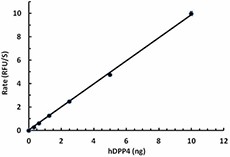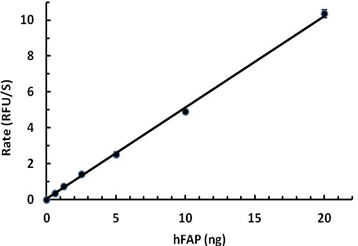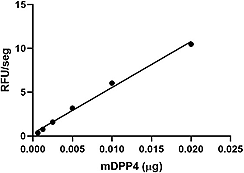- Regulatory Status
- RUO
- Other Names
- CD26, Adenosine deaminase binding protein (ADABP), Adenosine deaminase complexing protein2 (ADCP-2), Dipeptidyl peptidase IV (DPP IV)
- Ave. Rating
- Submit a Review
- Product Citations
- publications

-

The activity of human DPP4 was measured with 50 µM of fluorogenic substrate, Gly-Pro-AMC , in the presence of 0.312, 0.625, 1.25 , 2.50, 5.0, and 10.0 ng of hDPP4. The activity of hDPP4 is greater than 8500 pmole/min/µg.
Dipeptidyl peptidase IV (DPP4) is a multifunctional type II transmembrane serine peptidase. It is also known as a cell surface glycoprotein receptor, CD26, involved in the co-stimulatory signal essential for T-cell receptor (TCR)-mediated T-cell activation. It acts as a positive regulator of T-cell co-activation, by binding at least ADA, CAV1, IGF2R, and PTPRC. DPP4 is widely expressed in many specialized cell types and has distinct functions independently of its form, anchored to the membrane or in soluble form. The soluble form of DPP4 appears to be derived primarily from endothelial cells, epithelial cells, and leukocytes. It is upregulated in proinflammatory states including obesity, type-2 diabetes mellitus, and atherosclerosis. DPP4 is a serine aminopeptidase that cleaves preferentially Xaa–Pro dipeptides from oligopeptides with typical length of 30 amino acid, but tolerates other small residues at P1-position. Its biological substrates include many chemokines, mitogenic growth factors, neuropeptides and peptide hormones. Thus, it regulates various physiological processes by cleaving peptides in the circulation on the cell surface. It has been discovered that DPP4 may be a receptor for receptor binding domain (RBD) of spike entry glycoprotein in Middle East respiratory syndrome coronavirus (MERS-CoV).
Product DetailsProduct Details
- Source
- Human DPP4, amino acids Lys41-Pro766 (Accession #NM_001935) with a C-terminal TG-8H-GGQ tag was expressed in CHO cells.
- Molecular Mass
- The 742 amino acid recombinant protein has a predicted molecular mass of approximately 86.0 kDa. The non-reduced and DTT-reduced proteins migrate at 90 - 100 kDa by SDS-PAGE. It migrates as approximately 150 kDa protein in gel filtration.
- Purity
- >95%, as determined by Coomasie stained SDS-PAGE
- Formulation
- 0.22 µm filtered protein solution is in pH 7.5 buffer containing 20 mM TRIS and 300 mM NaCl.
- Endotoxin Level
- Less than 1.0 EU per µg of protein as determined by the LAL method
- Concentration
- 10 and 25 µg sizes are bottled at 200 µg/mL. 100 µg size and larger sizes are lot-specific and bottled at the concentration indicated on the vial. To obtain lot-specific concentration and expiration, please enter the lot number in our Certificate of Analysis online tool.
- Storage & Handling
- Unopened vial can be stored at -20 °C or -70°C for six months. For maximum results, quick spin vial prior to opening. Avoid repeated freeze/thaw cycles.
- Activity
- Human DPP4 cleaves a fluorogenic peptide substrate Gly-Pro-AMC with a specific activity value greater than 8500 pmol/µg/min.
- Application
-
Bioassay
- Application Notes
-
Human DPP4 Activity assay
Human DPP4 activity is measured by its ability to cleave a fluorogenic peptide substrate Gly-Pro-AMC. The increase of the product is monitored by increase in intensity of fluorescence at 460 nm with excitation at 380 nm. This protein is in the activated form and does not require further activation for bioassay. The purified recombinant DPP4 behaves as a non-disulfide-bonded dimer based on the analysis of SDS PAGE and gel filtration.
Materials
- Assay Buffer: pH 8.0, 25 mM Tris
- Recombinant Human DPP-4
- DPP-4 substrate: Gly-Pro-AMC
Activity assay procedures
- Dilute hDPP4 in the assay buffer at 0.1 µg/mL (0.1 ng/µL).
- Dilute the substrate at 100 µM in Assay Buffer.
- Load into a well plate 50 μL of the 0.1 ng/μL hDPP4 and start the reaction by adding 50 μL of 100 μM Substrate. Include a substrate blank containing 50 μL of Assay Buffer and 50 μL of 100 μM Substrate solution.
- Read the product formation by measuring 380/460 nm (Excitation/Emission) in kinetic mode for 5 minutes.
The final hDPP4 concentration is 0.05 µg/mL (0.05 ng/uL; 5 ng)
The final concentration of the substrate is 50 µM.
BioLegend carrier-free recombinant proteins provided in liquid format are shipped on blue-ice. Our comparison testing data indicates that when handled and stored as recommended, the liquid format has equal or better stability and shelf-life compared to commercially available lyophilized proteins after reconstitution. Our liquid proteins are verified in-house to maintain activity after shipping on blue ice and are backed by our 100% satisfaction guarantee. If you have any concerns, contact us at tech@biolegend.com.
Antigen Details
- Distribution
-
High expression in RPTEC/TERT1, BJ-hTERT, and ASC-TERT1 cell line; Moderate expression in PC-3 and Hep G2 cell line
- Interaction
- T-Cell; Lymphocyte
- Ligand/Receptor
- Adenosin deaminase (ADA), RANTES, stromal cell-derived factor (SDF)-1α, glucose-dependent insulinotropic polypeptide (GIP), and glucagon-like peptide-1 (GLP-1)
- Bioactivity
- T-Cell activation; Dipeptidase activity
- Biology Area
- Costimulatory Molecules
- Molecular Family
- Enzymes and Regulators
- Antigen References
-
1. Metzemaekers M, et al. 2016. Front in Immunology 7:483.
2. Song W, et al.2014. Virology 471-473:49.
3. Ohnuma K, et al. 2007. J. Biol. Chem. 282:10117.
4. Engel M, et al. 2003. PNAS USA. 100:5063.
5. Morimoto C, et al. 1989. J. Immunol. 143:3430. - Gene ID
- 1803 View all products for this Gene ID
- UniProt
- View information about DPP4 on UniProt.org
Related Pages & Pathways
Pages
Related FAQs
- Why choose BioLegend recombinant proteins?
-
• Each lot of product is quality-tested for bioactivity as indicated on the data sheet.
• Greater than 95% Purity or higher, tested on every lot of product.
• 100% Satisfaction Guarantee for quality performance, stability, and consistency.
• Ready-to-use liquid format saves time and reduces challenges associated with reconstitution.
• Bulk and customization available. Contact us.
• Learn more about our Recombinant Proteins. - How does the activity of your recombinant proteins compare to competitors?
-
We quality control each and every lot of recombinant protein. Not only do we check its bioactivity, but we also compare it against other commercially available recombinant proteins. We make sure each recombinant protein’s activity is at least as good as or better than the competition’s. In order to provide you with the best possible product, we ensure that our testing process is rigorous and thorough. If you’re curious and eager to make the switch to BioLegend recombinants, contact your sales representative today!
- What is the specific activity or ED50 of my recombinant protein?
-
The specific activity range of the protein is indicated on the product datasheets. Because the exact activity values on a per unit basis can largely fluctuate depending on a number of factors, including the nature of the assay, cell density, age of cells/passage number, culture media used, and end user technique, the specific activity is best defined as a range and we guarantee the specific activity of all our lots will be within the range indicated on the datasheet. Please note this only applies to recombinants labeled for use in bioassays. ELISA standard recombinant proteins are not recommended for bioassay usage as they are not tested for these applications.
- Have your recombinants been tested for stability?
-
Our testing shows that the recombinant proteins are able to withstand room temperature for a week without losing activity. In addition the recombinant proteins were also found to withstand four cycles of freeze and thaw without losing activity.
- Does specific activity of a recombinant protein vary between lots?
-
Specific activity will vary for each lot and for the type of experiment that is done to validate it, but all passed lots will have activity within the established ED50 range for the product and we guarantee that our products will have lot-to-lot consistency. Please conduct an experiment-specific validation to find the optimal ED50 for your system.
- How do you convert activity as an ED50 in ng/ml to a specific activity in Units/mg?
-
Use formula Specific activity (Units/mg) = 10^6/ ED50 (ng/mL)
 Login / Register
Login / Register 










Follow Us